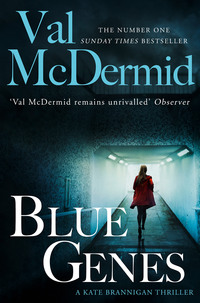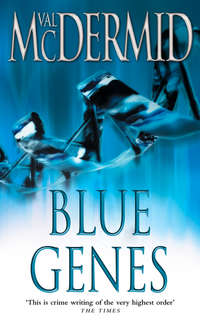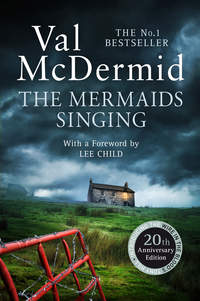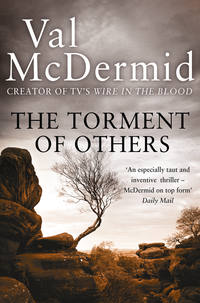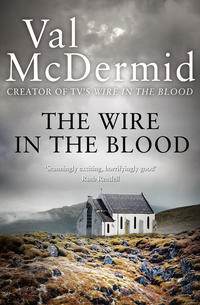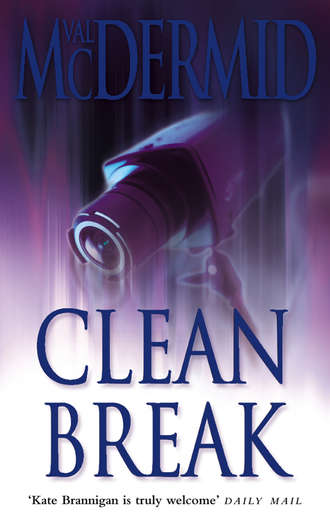
Полная версия
Clean Break
‘Let’s do just that,’ Kerr said, heaving himself to his feet. ‘Come on, Miss Brannigan. Come and see how the workers earn a living.’
I followed Kerr out of the room. Unsworth hung back, holding the door open and falling in beside me as we strode down the covered walkway that linked the administration offices with the factory. ‘It’s a real mystery,’ he offered.
I had my own ideas about what was going on, but for the time being I decided to keep them to myself. ‘The drums that have been returned,’ I said, ‘are they all sealed, or have some of them already been opened?’
‘Some of them have been started on,’ he said. ‘The batch went out into the warehouse the Tuesday before last. They’ll probably have started taking it out on the Thursday or Friday, going by our normal stockpile levels, so there’s been plenty of time for people to use them.’
‘And no one else has reported any adverse effect?’
Unsworth looked uncomfortable. ‘Not as such,’ he said.
Kerr half turned to catch my reply. ‘But?’ I asked.
Unsworth glanced at Kerr, who nodded impatiently. ‘Well, a couple of the wholesalers and one or two of the reps had already had containers from that batch returned,’ Unsworth admitted.
‘Do you know why that was?’ I asked.
‘Customers complained the goods weren’t up to us usual standard,’ he said grudgingly.
‘What sort of complaints?’ Kerr demanded indignantly. ‘Why wasn’t I told about this?’
‘It’s only just come to light, Mr Kerr. They said the KerrSter wasn’t right. One of them claimed it had stripped the finish off the flooring in his office toilets.’
Kerr snorted. ‘He should tell his bloody workforce to stick with Boddingtons. They’ll have been pissing that foreign lager all over the bloody tiles.’
‘Have you had the chance to analyse any of the containers that have come back?’ I butted in.
Unsworth nodded. ‘The lads in the lab worked through the night on samples from some of the drums. There wasn’t a trace of cyanide in any of them.’
Kerr shouldered open a pair of double doors. As I caught one on the backswing, the smell hit me. It was a curious amalgam of pine, lemon, and soap suds, but pervaded throughout with sharp chemical smells that bit my nose and throat. It was a bit like driving past the chemical works at Ellesmere Port with one of those ersatz air fresheners in the car. The ones that make you feel that a rotting polecat under the driver’s seat would be preferable. Right after the smell came the noise of machinery, overlaid with the bubbling and gurgling of liquid. Kerr climbed a flight of narrow iron stairs, and I followed him along a high-level walkway that travelled the length of the factory floor. It was unpleasantly humid. I felt like a damp wash that’s just been dumped in the tumble dryer.
Beneath us, vats seethed, nozzles squirted liquid into plastic containers, and surprisingly few people moved around. ‘Not many bodies,’ I said loudly over my shoulder to Unsworth.
‘Computer controlled,’ he said succinctly.
Another avenue to pursue. If the sabotage was internal, perhaps the culprit was simply sending the wrong instructions to the plant. I’d thought this was going to be a straightforward case of industrial sabotage, but my head was beginning to hurt with the permutations it was throwing up.
A couple of hundred yards along the walkway, we descended and cut through a heavy door into a warehouse. Now I know how the Finns feel when they walk into the snow from the sauna. I could feel my pores snapping shut in shock. Here, the air smelled of oil and diesel. The only sound came from fork-lift trucks shunting pallets on and off shelves. ‘This is the warehouse,’ Kerr said. I’d never have worked that one out all by myself. ‘The full containers go through from the factory to packing, where the machines label them, stamp them with batch numbers and seal-wrap them in dozens. Then they come through here on conveyor belts and they’re shelved or loaded.’ He turned to Unsworth. ‘Where have you stacked the recalls?’
Before Unsworth could reply, my mobile started ringing. ‘Excuse me,’ I said, moving away a few yards and pulling the phone out. ‘Kate Brannigan,’ I announced.
‘Tell me,’ an amused voice said. ‘Is Alexis Lee a real person, or is it just your pen name?’
I recognized the voice at once. I moved further away from Kerr’s curious stare and turned my back so he couldn’t see that my ears had gone bright red. ‘She’s real all right, Mr Haroun,’ I said. ‘Why do you ask?’
‘Oh, I think it had better be Michael. Otherwise I’d start to suspect you were being unfriendly. I’ve just been handed the early edition of the Evening Chronicle.’
‘And what does it say?’
‘Do you really need me to tell you?’ he asked, still sounding amused.
‘I forgot to bring my crystal ball with me. If you want to hang on, I’ll see if I can find a chicken to disembowel so I can check out the entrails.’
He laughed. It was a sound I could easily get used to. ‘It’d be a lot simpler to pop into a newsagent.’
‘You’re not going to tell me?’
‘Oh no, I’d hate to spoil the surprise. Tell me, Kate…Do you fancy dinner some evening?’
‘Michael, it may not look like it, but I fancy dinner every evening.’ I couldn’t believe myself – I’d read better lines than that in teenage romances.
Bless him, he laughed again. I like a man who doesn’t seize on the first sign of weakness. ‘Are you free this evening?’
I pretended to think. Let’s face it, I’d have turned down Mel Gibson, Sean Bean, Lynford Christie and Daniel Day-Lewis for dinner with Michael Haroun. I didn’t pretend for too long, in case he lost interest. ‘I can be. As long as it’s after seven.’
‘Great. Shall I pick you up?’
That was a harder decision. I didn’t want to let myself forget that this was a business dinner. On the other hand, it wouldn’t hurt to give Richard something to think about. I gave Michael the address and we agreed on half past seven. Unlike everybody on TV who uses a mobile phone, I hit the ‘end’ button with a flourish, then turned back to a scowling Trevor Kerr.
‘Sorry about that,’ I lied. ‘Somebody I’ve been trying to get hold of on another investigation. Now, Mr Unsworth, you were going to show us these recalled containers.’
The next half-hour was one of the more boring ones in my life, made doubly so by the fact that I was itching to get my hands on the Chronicle. I finally escaped at half past eleven, leaving Trevor Kerr with the suggestion that his chemists should analyse the contents of a random sample of the containers. Only this time, they wouldn’t just be looking for cyanide. They’d be checking to see whether the KerrSter in the drums was the real thing. Or something quite different and a whole lot nastier.
* * *
By the third newsagent’s, I’d confirmed what I’d always suspected about Farnworth. It’s a depressing little dump that civilization forgot. Nobody had the Chronicle. They wouldn’t have it till some time in the afternoon. They all looked deeply offended and incredulous when I explained that no, the Bolton Evening News just wouldn’t be the same. I had to possess my soul in patience till I hit the East Lancs. Road. I sat on a garage forecourt reading the results of Alexis’s research. She’d done me proud.
CULTURAL HERITAGE VANISHES
A series of spectacular robberies has been hushed up by police and stately home owners.
Now fears are growing that a gang of professional thieves are stripping Britain of valuable artworks that form a key part of the nation’s heritage. Among the stolen pieces are paintings by French Impressionists Monet and Cézanne, and a bronze bust by the Italian Baroque master Bernini. Also missing is a collection of Elizabethan miniature paintings by Nicholas Hilliard. Together, the thieves’ haul is estimated at nearly £10 million.
The cover-up campaign was a joint decision made by several police forces and the owners of the stately homes in question. Police did not want publicity because they were following up leads and did not want the thieves to know that they had realized one gang was behind the thefts.
And the owners were reluctant to admit the jewels of their collections had gone missing in case public attendance figures at their homes dropped off as a result.
Some owners have even resorted to hanging replicas of the missing masterpieces in a bid to fool the public.
The latest victim of the audacious robbers is the owner of a Cheshire manor house. Police have refused to reveal his identity, but will only say that a nineteenth-century French painting has been stolen.
The cheeky thieves have adopted the techniques of the pair who caused outrage at the Lillehammer Olympics when they stole Edward Munch’s The Scream.
They break in through the nearest door or window, go straight to the one item they have selected and make their getaway. Often they are in the house or gallery for no more than a minute.
A police source said last night, ‘There’s no doubt that we are dealing with professionals who may well steal to order. There are obviously a limited number of outlets for their loot, and we are making inquiries in the art world.’
One of the robbed aristos, who was only prepared to talk anonymously, said, ‘It’s not just the heritage of this country that is at stake. It’s our businesses. We employ a lot of people and if the public stop coming because our most famous exhibits have gone, it will have repercussions.
‘We do our best to maintain tight security, but you can never keep the professional out.’
There was some more whingeing in the same vein, but nothing startling. Call me nit-picking, but I’ve never understood how the art of several European cultures has come to be a key part of our British heritage, unless it symbolizes the brigand spirit that made the Empire great. That aside, I reckoned Alexis’s story would achieve what I hoped for. With a bit of luck, the nationals would pick the story up the next morning, and the jungle drums would start beating. Soon it would be time for a chat with my friend Dennis. If he ever decides to go completely straight, he could make a living as a journalist. I’ve never known anybody absorb or disseminate so much criminal intelligence. I’m just grateful some of it comes my way when I need it.
For the time being, I headed back to the office, stopping to pick up a couple of pizzas on the way. I knew Shelley would be waiting behind the door with a pile of paperwork that would cause more concussion than a rolling pin. At least a pizza offering might reduce the aggro to a minimum.
I was halfway through the painful process of signing cheques when Josh arrived. I pretended astonishment. ‘Josh!’ I exclaimed. ‘It’s between the hours of one and three and you’re not in a restaurant! What’s happened? Has the stock market collapsed?’
His sharp blue eyes crinkled in the smile that he’s practised to maximize his resemblance to Robert Redford. Frankly, I’m surprised the light brown hair hasn’t been bleached to perfect it, since Josh is a man whose energies are devoted to only two things – making lots of money and women. His track record with the latter is dismal; luckily he’s a lot more successful with the former, which is how he’s ended up as the senior partner of one of the city’s most successful master brokerages. Shelley developed a theory about Josh and women after she did her A level psychology. She reckons that behind the confident façade there lurks a well of low self-esteem. So when it comes to women, his subconscious decides that any woman with half a brain and a shred of personality wouldn’t spend more than five minutes with him. The logical extension of that is that any woman who sticks around for more than six weeks must by definition be a boring bimbo, and thus he shouldn’t be seen dead with her.
Me, I think he just likes having fun. He swears he plans to retire when he turns forty, and that’s early enough to think about settling down. I like him because he’s always treated me as an equal, never as a potential conquest. I’m glad about that; I’d hate to lose my fast track into the bowels of the financial world. Believe me, the Nikkei Index doesn’t burp without Josh knowing exactly what it had for dinner.
Josh flicked an imaginary speck of dust off one of the clients’ chairs and sat down, crossing his elegantly suited legs. ‘Things are changing in the big bad world of money, you know,’ he said. ‘The days of the three-hour lunch are over. Except when it’s you that’s buying, of course.’ He tossed a file on to my desk.
‘You’ve stopped doing lunch?’ I waited for the world to stop turning.
‘Today, I had a Marks and Spencer prawn sandwich in the office of one of my principal clients. Washed down with a rather piquant sparkling mineral water from the Welsh valleys. An interesting diversification from coal mining, don’t you think?’
I picked up the file. ‘Kerrchem?’ ‘The same. Want the gossip since I’m here?’ I gave him my best suspicious frown. ‘Is this going to cost me?’
He pouted. ‘Maybe an extra glass of XO?’ ‘It’s worth it,’ I decided. ‘Tell me about it.’ ‘OK. Kerrchem is a family firm. Started in 1934 by Josiah Kerr, the grandfather of the present chairman, chief executive and managing director Trevor Kerr. They made soap. They were no Lever Brothers, though they’ve always provided a reasonable living for the family. Trevor’s father Hartley was a clever chap, by all accounts, had a chemistry degree, and he made certain they spent enough on R & D to keep ahead of the game. He moved them into the industrial cleaning market.’ All this off the top of his head. One of the secrets of Josh’s success is a virtually photographic memory for facts and figures. Figures of the balance sheet variety, that is.
‘Hartley Kerr was an only child,’ he continued. ‘He had three kids: Trevor, Margaret and Elizabeth. Trevor, although the youngest, owns forty-nine per cent of the shares, Margaret and Elizabeth own twenty per cent each. The remaining eleven per cent is held by Hartley Kerr’s widow, Elaine Kerr. Elaine is in her early seventies, in full possession of her marbles, lives in Bermuda, and takes little part in things except for voting against Trevor at every opportunity. Trevor’s sons are still at school, but he has three nephews who work at Kerrchem. John Hardy works in R & D, his brother Paul is in accounts and Margaret’s son Will Tomasiuk is in sales. Trevor is by all accounts a complete and utter shit, but against all the odds, he appears to run the company well. Never been a history of industrial problems. Financially and fiscally all seems above board. Frankly, Kate, if Kerrchem were going public, they’re exactly the kind of company I’d advise you to put your money in if you wanted to keep it unspectacularly safe. Before people started dying, that is.’
‘I suppose that rules out an insurance job, then. Is everybody in the family happy with Trevor’s stewardship? No young bucks snapping at his heels?’
Josh shook his head. ‘That’s not the word on the exchange floor. The old lady only votes against Trevor because she thinks he’s not a patch on his old man and she wants to make a point. And the nephews have all learned the business from the bottom up, but they’re climbing the greasy pole at an impressive rate. So, no, that kite won’t fly, Kate.’ He glanced at a watch so slim it looked anorexic and uncrossed his legs.
‘You’re a star, Josh. I owe you a meal.’
‘Fix up a date with Julia, would you? I don’t have my diary with me.’ He stood up and I came round the desk to swap kisses on both cheeks. I watched five hundred pounds worth of immaculate tailoring walk out the door. Not even that amount of dosh to spend on clothes could make me spend my days talking about pension funds and unit trusts.
On the other hand, all it took to get me salivating at the thought of an evening’s conversation about insurance was a profile from an ancient carving. Maybe I wasn’t such a smart cookie after all.
6
I’d almost forgotten there are restaurants that don’t serve dim sum. For as long as I’ve known Richard, he’s maintained that if you don’t use chopsticks on it, it ain’t food. And Josh has recently taken to extracting his payment in kind in Manchester’s clutch of excellent Thai restaurants. I’m not sure if that’s down to the food or the subservient waitresses. Either way, I’d entirely lost touch with anything that didn’t come out of a wok. Which made Michael Haroun a refreshing change in more ways than one.
He’d arrived promptly at twenty-nine minutes past seven. I’d grown so used to Richard’s flexible idea of time that I was still applying eye pencil when the doorbell rang. I nearly poked my eye out in shock, and had to answer the door with a tissue covering the damage. Eat your heart out, Cindy Crawford. Michael lounged against the door frame, looking drop-dead gorgeous in blue jeans, navy silk blouson and an off-white collarless linen shirt that sure as hell hadn’t come from Marks and Spencer. My stomach churned, and I don’t think it was hunger. ‘Long John Silver, I presume,’ he said.
‘Watch it, or I’ll set the parrot on you,’ I replied, stepping back and waving him in.
He shrugged away from the door and followed me down the hall. I gestured towards the living room and said, ‘Give me a minute.’
Back in the bathroom, I repaired the damage and surveyed myself in the full-length mirror. Navy linen trousers, russet knitted silk T-shirt, navy silk tweed jacket. I looked like I’d taken a bit of trouble, without actually departing from the businesslike image. Michael wasn’t to know this was my newest, smartest outfit. Besides, I’d told Richard my evening engagement was a business meeting, and I wasn’t entirely ready for him to get any other ideas if he saw me leave.
I rubbed a smudge of gel over my fingers and thrust them through my hair, which I’d kept fairly short since I was shorn without consultation earlier in the year. My right eye still looked a bit red, but this was as good as it was going to get. A quick squirt of Richard’s Eternity by Calvin Klein and I was ready.
I walked down the hall and stood in the doorway. Michael obviously hadn’t heard me. He was deep in a computer gaming magazine. Bonus points for the boy. I cleared my throat. ‘Ready when you are,’ I said.
He looked up and smiled appreciatively. ‘I don’t want to sound disablist,’ he said, ‘but I have to admit I prefer the two-eyed look.’ He closed the magazine and stood up. ‘Shall we go?’
He drove a top-of-the-range Citroën. ‘Company car?’ I asked, looking forward to the prospect of being driven for a change.
‘Yeah, but they let me choose. I’ve always had a soft spot for Citroën. I think the DS was one of the most beautiful cars ever built,’ he said as he did a neat three-point turn to get out of the parking area outside my bungalow. ‘My father always used to drive one.’
That told me Michael Haroun hadn’t grown up on a council estate with the arse hanging out of his trousers. ‘Lucky you,’ I said with feeling. ‘My dad works for Rover, so my childhood was spent in the back of a Mini. That’s how I ended up only five foot three. The British equivalent of binding the feet.’
Michael laughed as he hit a button on the CD player and Bonnie Raitt filled the car. Richard would have giggled helplessly at something so middle of the road. Me, I was just glad of something that didn’t feature crashing guitars or that insistent zippy beat that sounds just like a fly hitting an incinerator. We turned out of the small ‘single professionals’ development where I live and into the council estate. To my surprise, instead of heading down Upper Brook Street towards town, he turned left. As we headed down Stockport Road, my heart sank. I prayed this wasn’t going to be one of those twenty-mile drives to some pretentious bistro in the sticks with compulsory spinach pancakes and only one choice of vodka.
‘You into computer games, then?’ I asked. Time to check out just how much I had in common with this breathtaking profile.
‘I have a 486 multi-media system in my spare room. Does that answer the question?’
‘It’s not what you’ve got, it’s what you do with it that counts,’ I replied. As soon as I’d spoken, I wished I was on a five-second delay loop, like radio phone-ins.
He grinned and listed his current favourites. We were still arguing the relative merits of submarine simulations when he pulled up outside a snooker supplies shop in an unpromising part of Stockport Road. A short walk down the pavement brought us to That Café, an unpretentious restaurant done out in Thirties style. I’d heard plenty of good reports about it, but I’d never quite made it across the door before. The locale had put me off for one thing. Call me fussy, but I like to be sure that my car’s still going to be waiting for me after I’ve finished dinner.
The interior looked like flea market meets Irish country pub, but the menu had me salivating. The waitress, dressed in jeans, a Deacon Blue T-shirt, big fuck-off Doc Marten boots and a long white French waiter’s apron, showed us to a quiet corner table next to a blazing fire. OK, they only had one vodka, but at least it wasn’t some locally distilled garbage with a phoney Russian name.
As our starters arrived, I said ruefully, ‘I wish finding Henry Naismith’s Monet was as easy as a computer game.’
‘Yeah. At least with games, there’s always a bulletin board you can access for hints. I suppose you’re out on your own with this,’ Michael said.
‘Not entirely on my own,’ I corrected him. ‘I do have one or two contacts.’
He swallowed his mouthful of food and looked slightly pained. ‘Is that why you agreed to have dinner with me?’ he asked.
‘Only partly.’
‘What was the other part?’ he asked, obviously fishing.
‘I enjoy a good scoff, and I like interesting conversation with it.’ I was back in control of myself, the adolescent firmly stuffed back into the box marked ‘not wanted on voyage’.
‘And you thought I’d be an interesting conversationalist, did you?’
‘Bound to be,’ I said sweetly. ‘You’re an insurance man, and right now insurance claims are one of my principal interests.’
We ate in silence for a few moments, then he said, ‘I take it you were behind the story in the Chronicle?’
I shrugged. ‘I like to stir the pot. That way, the scum rises to the surface.’
‘You certainly stirred things around our office,’ Michael said drily.
‘The people have a right to know,’ I said, self-righteously quoting Alexis.
‘Cheers,’ Michael said, clinking his glass against mine. ‘Here’s to a profitable relationship.’
‘Oh, you mean Fortissimus are going to hire Mortensen and Brannigan?’ I asked innocently.
He grinned again. ‘I think I’ll pass on that one. I simply meant that with luck, you might track down Henry Naismith’s Monet.’
‘Speaking of which,’ I said, ‘I spoke to Henry this afternoon. He says your assessor was there this afternoon.’
‘That’s right,’ Michael said cagily.
‘Henry says your man put a very interesting suggestion to him. Purely in confidence. Now, would that be the kind of confidence you’re already privy to?’
Michael carefully placed his fork and knife together on the plate and mopped his lips with the napkin. ‘It might be,’ he said cautiously. ‘But if it were, I wouldn’t be inclined to discuss it with someone who has a hotline to the front page of the Chronicle.’
‘Not even if I promised it would go no further?’
‘You expect me to believe that after today’s performance?’ he demanded.
I smiled. ‘There’s a crucial difference. I was acting in my client’s best interests by setting the cat among the pigeons with Alexis’s story. I didn’t breach my client’s confidentiality, and I didn’t tell Alexis anything that wasn’t already in the public domain. She just put the bits together. However, if Henry acted on your colleague’s suggestion and I leaked that to the press, it would seriously damage his business. And I don’t do that to the people who pay my mortgage. Trust me, Michael. It won’t go any further.’


